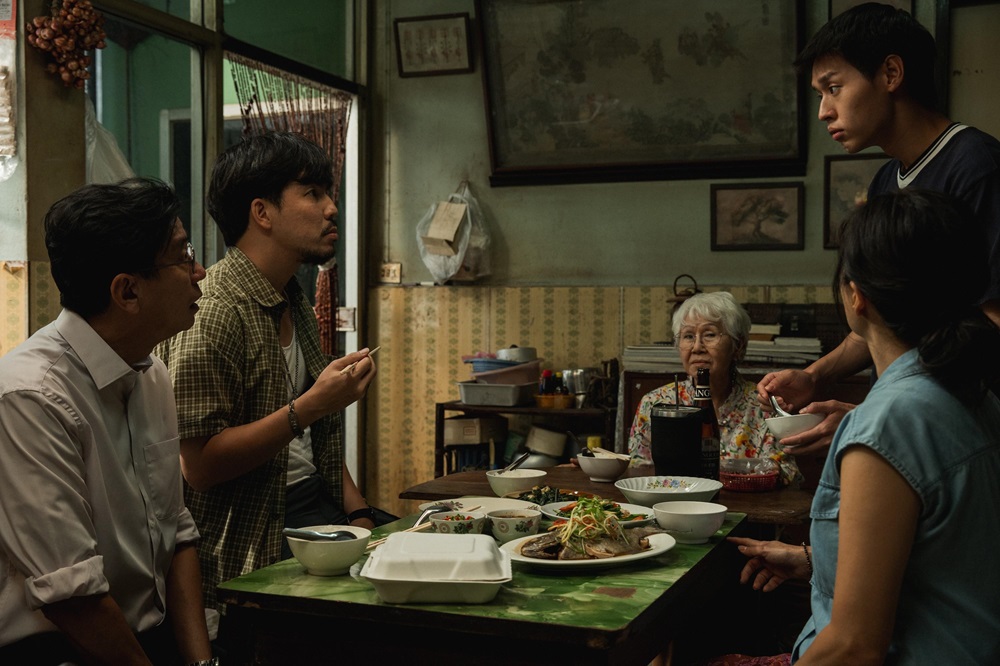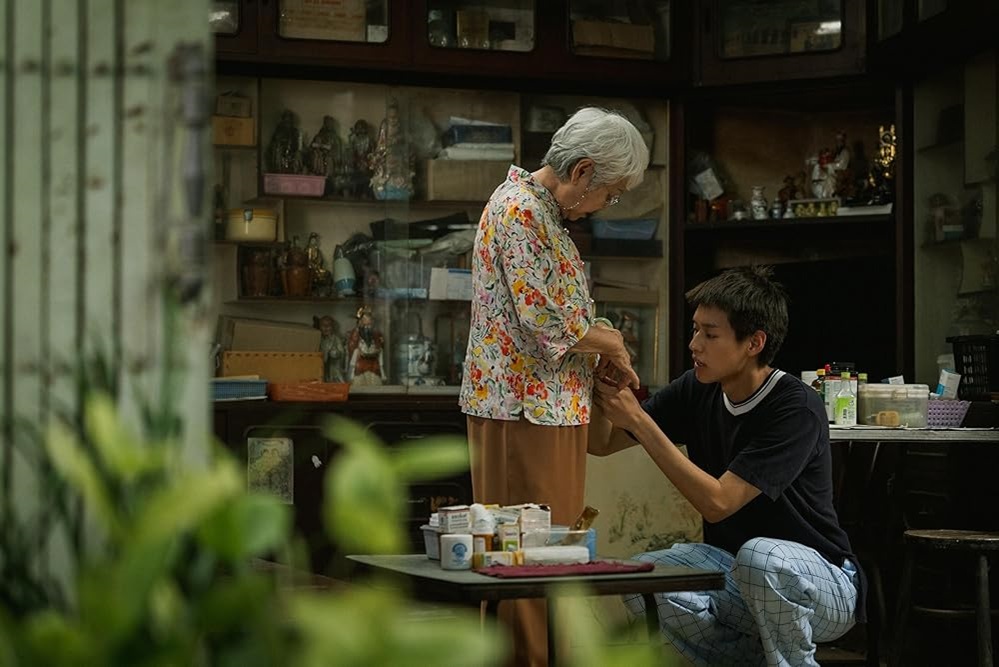As a reckoning with regret, the film is about rediscovering long-forgotten familial connections, and coming to terms with the fact that some things just can’t be quantified. And by entrusting the film to actors Putthipong Assaratanakul and Usha Seamkhum—in their debut starring feature film roles, no less—Boonnitipat makes a case for overt sentimentality that really works, only when done right.
A Story Rooted in Family Obligations and Self-Interest
“How to Make Millions” follows M (Assaratanakul), a disillusioned university dropout and failed video game streamer who finds himself at a crossroads. When his grandmother Amah (Seamkhum) is diagnosed with terminal cancer, M seizes the opportunity to redeem his life by becoming her primary caregiver.
While on surface it seems like a noble gesture, M’s motives are far from selfless. Encouraged by his cousin Mui (Tontawan Tantivejakul), who inherited their late grandfather’s estate after tending to him, M believes that if he devotes himself to Amah’s care, her house will eventually be his.
As M moves in with Amah, he encounters more than just the practical realities of caregiving. Amah is a fiercely independent woman, continuing to sell congee (a savory rice porridge) at the market despite her age and illness, and she isn’t quick to trust her grandson’s sudden interest in her well-being. What starts as a calculated plan evolves into something more meaningful as M grows closer to his grandmother through shared routines and difficult conversations.
Meanwhile, the rest of the family—especially Amah’s gambling-addicted son Soei (Pongsatorn Jongwilas) and pragmatic but overlooked daughter Sew (Sarinrat Thomas)—adds tension, as they each wrestle with their own motives and unresolved histories with Amah.

‘How to Make Millions’: A Meditation on Messy Family Dynamics
At its core, ‘How to Make Millions’ is a meditation on the complicated, often unspoken dynamics within families. More than the lack of subtlety in its title’s directness, it doesn’t shy away from exposing how money and inheritance can bring out the worst in people, even as it delicately portrays the everyday gestures of love and care that form the backbone of family life.
Boonnitipat’s direction shines the light on authentic Asian family structures, where filial piety and the duty to care for elders are deeply ingrained, yet fraught with unspoken tensions. The contrast between M’s initial self-serving goals and his gradual emotional awakening makes for a compelling character arc, though Boonnitipat smartly keeps M’s true motivations ambiguous enough to maintain an air of complexity throughout.
Several moments throughout the movie, I found myself thinking of similarly themed Asian films that examine the tender, difficult relationships between caregivers and the elderly. Boonnitipat’s debut, warts and all, feels somehow like a cross between Ann Hui’s “A Simple Life” and Hirokazu Kore-eda’s “Still Walking,” with a touch of saccharine melodrama of Maryo J. delos Reyes’ “Magnifico.” Boonnitipat’s debut finds beauty in the mundane, infusing everyday interactions with emotional weight. Scenes of Amah preparing rice porridge or M helping her bathe, simple as they are, take on greater significance as their bond deepens.
Deliberately Paced Melodrama that Requires Patience
At 125 minutes, the film’s runtime is arguably its weakest link. The pacing drags in several places, particularly in the middle stretch where the narrative momentum stalls. While the quiet, reflective moments between M and Amah are central to the film’s emotional impact, there are times when it lingers too long on the mundane, testing the patience of even the most invested viewers.
Nevertheless, where the film risks overstaying its welcome, it redeems itself with its emotional sincerity. Boonnitipat and co-writer Thodsapon Thiptinnakorn both drew on their personal experiences caring for their grandmothers. This level of honesty results in a film that embraces melodrama in all its glory. As an essential ingredient in Asian storytelling, this is almost inescapable; yet the sentimentality feels earned here.
Moments that might otherwise be considered overwrought, such as M using an app to show Amah what she would look like if she were young again, or the family’s clumsy attempts at caregiving, are handled with such care and authenticity that they avoid slipping into mere cliché. The film’s heart lies in these moments where the emotional stakes lay bare. Boonnitipat understands that these big emotional moments reflect the realities of family life, where love and frustration often collide.
If anything, “How to Make Millions” uses these moments not as cheap ploys to manipulate the audience, but as authentic expressions of long-simmering feelings between family members. Here, Boonnitipat essentially reminds his audience that family, for all its flaws, remains an enduring source of connection; and whether we agree with him is beside the point.

A Tender and Flawed—but Rewarding—Journey
Boonnitipat’s confidence in his stars pays off, with their performances elevating the film’s emotional depth. Putthipong Assaratanakul shines in his portrayal of M, deftly capturing the character’s journey from opportunistic schemer to someone genuinely affected by his grandmother’s presence in his life.
However, for reasons that are clear as day, I reserve my highest praise for Usha Seamkhum, a first-time actor who, prior to this film, had only participated in a video for a seniors’ dance competition. As Amah, she is exceptional, effortlessly embodying the mix of pride, vulnerability, and weariness that comes with old age.
“How to Make Millions Before Grandma Dies” may be a tough watch both for its narrative and Boonnitipat’s direction, but I would argue that these imperfections are part of what makes it a good film. The slow pace will test the patience of some viewers, and its melodramatic moments may feel heavy-handed to those unfamiliar with the emotional underpinnings common in Asian cinema. But for those willing to embrace its rhythms and sentimentality, the film offers a rewarding experience.
It leans unapologetically into mawkish territory, but it does so with authenticity, as if to say that sometimes love is messy, emotional, and loud—and that’s perfectly okay. And as the final scenes play out while Jaithep Raroengjai’s heartstring-tugging score swells, I am certain that shedding a tear or two is the perfect way to show appreciation for this tender melodrama that truly works, only because it is done right.

You can now stream Pat Boonnitipat’s “How to Make Millions Before Grandma Dies” on Netflix. The film is Thailand’s official entry for the Best International Feature Film category at the 97th Academy Awards. Follow us for more coverage.


